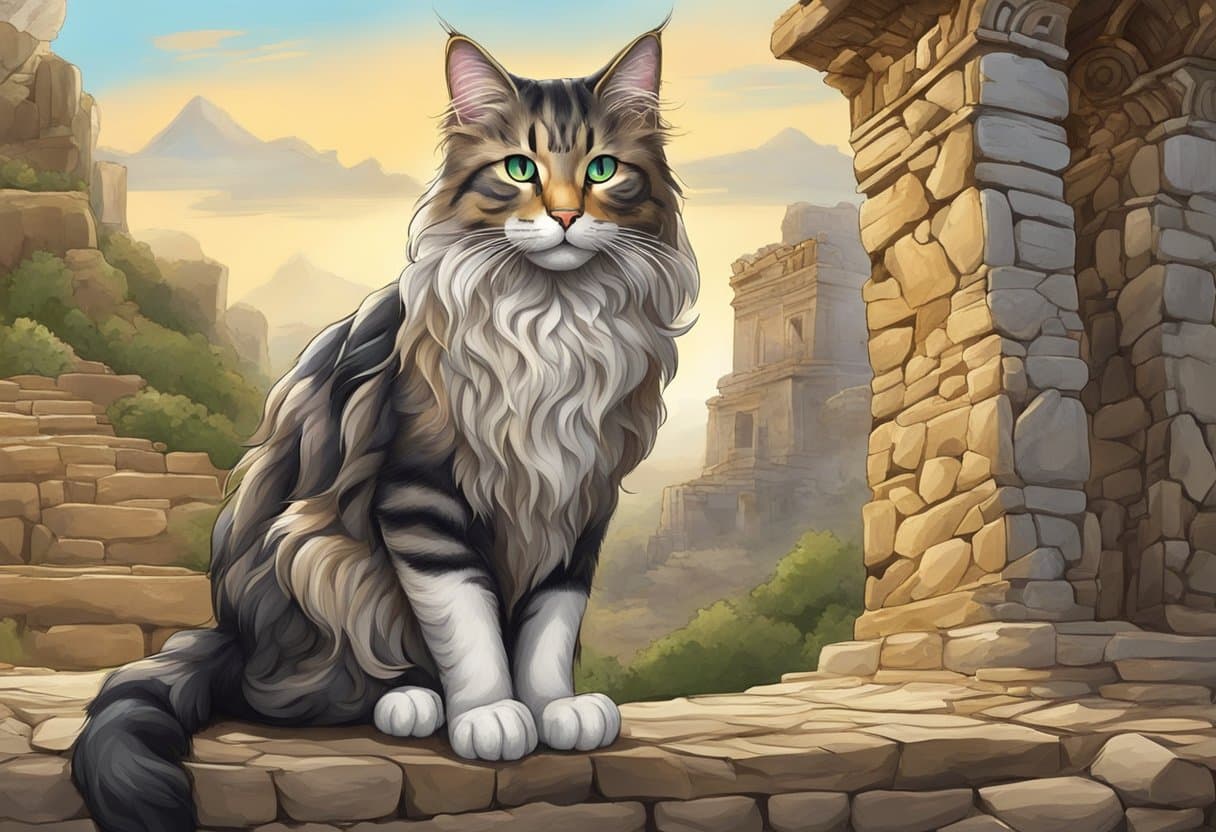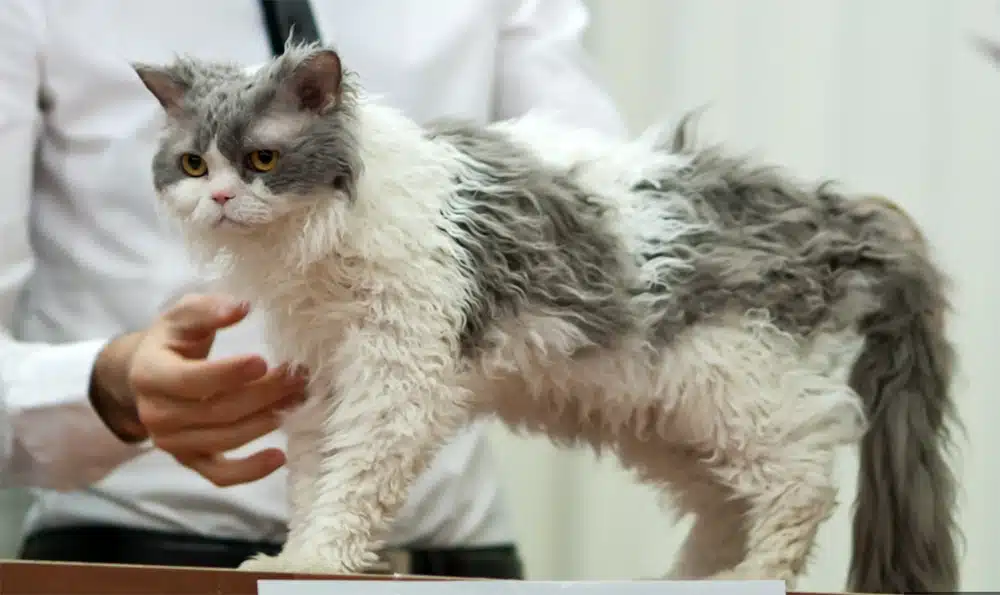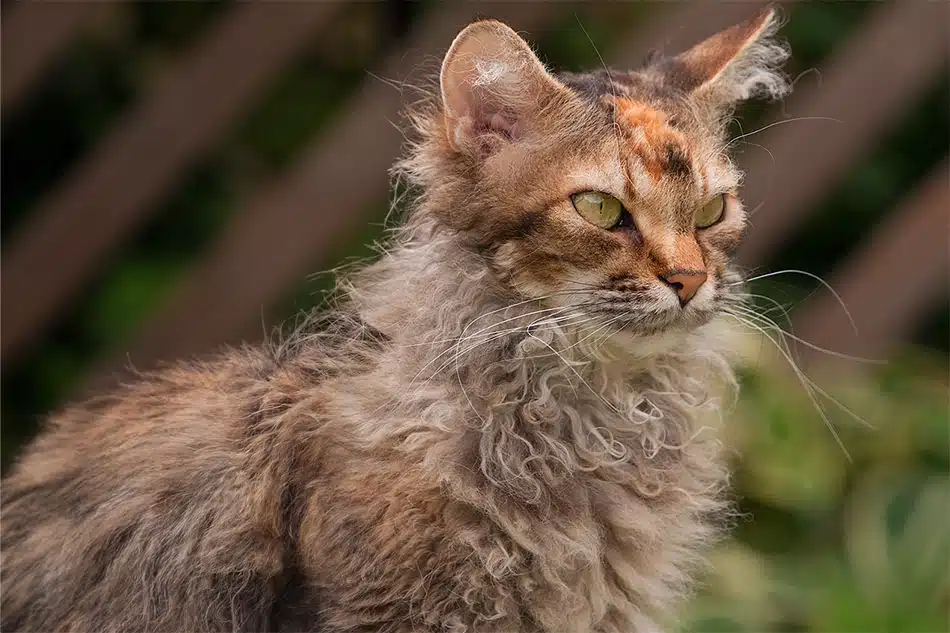Curly-haired cats, a rarity within the feline world, possess a distinctive coat that sets them apart from their straight-haired counterparts. The genetic mutation responsible for this unique fur texture results in breeds that have either missing or altered layers of hair. Typically, a cat has three layers of fur: the outer layer known as guard hair, a middle layer called the awn hair, and the undercoat. However, in curly-haired cat breeds, these layers can be affected, leading to the characteristic curls or waves.
Among the recognized curly-haired cat breeds, the Selkirk Rex, Devon Rex, Cornish Rex, and LaPerm stand out for their unique coats. These breeds exhibit varied patterns and degrees of curliness, often described as plush and soft to the touch. While the Selkirk Rex has a dense coat with loose, individual curls, the Devon Rex and Cornish Rex have a coat with tighter curls and less hair density, and the LaPerm features a more textured, ringlet-type curl. Each breed also carries its own distinct personality traits and temperaments, appealing to different preferences in potential cat owners.
Origins and History

The specific traits of curly-haired cats have piqued the interest of many due to their unique genetic mutations, which have led to various breeds with distinctive curly coats. This section elucidates the genetics and historical development of these fascinating feline breeds.
Genetic Mutation and Breeds Development
Curly-haired cats have emerged from genetic mutations that create their characteristic wavy coats. Specifically, these mutations have manifested separately across the globe, leading to the development of distinct breeds with curled or rex fur.
The Selkirk Rex breed originated from a genetic mutation in Montana, USA, in 1987. This breed began from a cat named Miss DePesto, who exhibited a naturally curly coat. Unlike other rex breeds, the Selkirk’s coat is exceptionally plush and thick due to the breeding with a Persian male, which contributed to the breed’s genetic diversity and overall health.
In addition to the Selkirk Rex, the LaPerm is another curly-coated breed that arose from a genetic mutation. This breed’s history began on an Oregon farm in the 1980s, with a kitten named Curly. The LaPerm is known for its tight curls and ringlets, resembling a shaggy perm hairstyle, which varies from soft waves to tight ringlets.
The Devon Rex possesses a coat of loose curls due to a mutation that occurred in England during the late 1950s. This breed is characterized by a thin, wavy coat and a peculiar appearance enhanced by large, bat-like ears.
Similarly, the Cornish Rex emerged in Cornwall, UK, in the 1950s through a natural mutation that resulted in a soft, curly coat. The breed is distinguished by its fine, short and wavy fur and an elegant, slender body.
The American Curl is renowned for not its coat, but its distinctive curled ears, a trait that originated from a spontaneous mutation in Southern California in 1981, creating a breed accentuated by curve-tipped ears.
Another lesser-known breed, the German Rex, was identified in Berlin in the late 1940s. Comparable to the Cornish Rex, the German Rex sports a slender build and a coat of soft, short waves.
Newer to the scene, the Tennessee Rex is a breed in development, known for its satin-like curly fur and a glittering sheen. This breed displays both a unique fur texture and a captivating visual effect.
Lastly, a breed known as Ural Rex displays a thick and wavy coat. They are an emerging breed from Russia, not as widely recognized yet but contributing to the diversity of rex cats.
Through these mutations, a variety of curly-coated cats continue to charm and expand the genetic tapestry of the feline world. Each breed carries a unique history and genetic legacy that has solidified their place within the diverse family of domestic cats.
Physical Characteristic
Curly-coated cats exhibit a distinctive and appealing look, characterized by their unique fur textures and notable physical traits that often draw attention.
Coat Variations
The primary allure of curly-coated cats lies in their curly fur, which can range from tight, spiral-shaped curls to softer, wavy hair. Sizes of these cats vary, with some breeds like the American Curl typically weighing between 5 to 10 pounds, showcasing the diversity within curly-haired cat breeds.
Distinctive Features
These cats are often recognized for their large ears, which can give an alien-like appearance or resemble bat-like ears, contributing to their unique appearance. Aside from their curls, many curly-haired cat breeds feature muscular builds, accentuating their grace and agility.


Breed-Specific Information
In the world of feline breeds, the distinguishing feature of curly coats emerges notably within a select few. Each breed offers a unique blend of this physical trait, paired with its own set of characteristics and care requirements.
Selkirk Rex
The Selkirk Rex stands out with its plush and curly coat, which is the result of a dominant genetic mutation. They boast curls that envelop not just their coat, but their whiskers as well. Recognized for their patience and tolerance, the Selkirk Rex makes for a gentle and friendly companion.
LaPerm Cat
LaPerm Cats are adorned with a curly coat that can vary from wavy to tight ringlets or even corkscrew curls. This breed’s curls also extend to their whiskers, and they are known for their affectionate nature and intelligence. The LaPerm has a playful demeanor and can be quite the conversationalist with their owners.
Devon Rex and Cornish Rex
Although the Devon Rex and Cornish Rex share the Rex name, they have distinct curly coats. The Devon Rex showcases a short, soft, and wavy coat, with large, low-set ears contributing to their elf-like appearance. They are highly social and enjoy being involved in family activities. On the other hand, the Cornish Rex is clothed in a coat of marcel waves, defined by a tight and uniform wave pattern. This breed is active, acrobatic, and enjoys interactive play with their humans.
Health and Care
Curly-haired cats require attentive grooming and health care to maintain their distinctive coats and overall well-being. They can exhibit breed-specific issues necessitating regular veterinary check-ups.
Grooming Needs
Curly-furred felines have unique grooming needs due to their coat’s texture. Regular brushing is essential to prevent matting and to manage shedding. Specifically, breeds like the Selkirk Rex benefit from gentle grooming to preserve their curls, not straighten them. Cats with curly hair, such as the Cornish Rex, may have less undercoat, which can reduce shedding and may be less prone to traditional hairball issues.
Common Health Issues
Certain curly-coated breeds experience distinct health issues. For example, the American Curl is predisposed to ear-related concerns due to its curled ears, requiring extra care during grooming. Regular visits to the veterinarian are crucial for monitoring health conditions and obtaining care advice tailored to individual breeds, helping prevent and address any breed-specific or genetic conditions.


Behavior and Temperament
When it comes to curly-coated cats, particularly the American Curl breed, their behavior and temperament are distinct and endearing, often characterized by a sociable personality and moderate activity levels.
Social Behaviors
The American Curl is known for its friendly and affectionate nature. These cats thrive in the company of humans and are often eager to join in on household activities. They exhibit a sociable demeanor, not only with their human family members but also with other pets, making them excellent companions. It’s not uncommon for an American Curl to greet visitors with curiosity rather than hide, indicative of their outgoing personality.
- Affectionate: Curls tend to form strong bonds with their owners.
- Gregarious: They are comfortable in homes with children and other pets.
Activity Levels
Despite their playful disposition, American Curls possess a balanced activity level that is not overly demanding. While they enjoy interactive play, they are just as content to relax beside their human companions. Their playful streak often shows in mischievous behaviors, such as pouncing on unsuspecting toys or exploring high shelves.
- Moderate Energy: Ideal for families or individuals seeking a cat who is not overly hyperactive.
- Playful Antics: Engages in playful behavior without being overly disruptive.
A typical day for an American Curl involves bursts of playfulness interspersed with periods of relaxation, a testament to their even-keeled temperament. They maintain a youthful disposition well into adulthood, earning them the nickname “Peter Pan” of cats, a description well suited to their curious and playful nature.
Considerations for Potential Owners
Before inviting a curly-haired cat into their home, potential pet parents should consider two significant aspects: managing allergies and ensuring lifestyle compatibility.
Managing Allergies
Curly-haired cats, often perceived as hypoallergenic, may be more suitable for individuals with cat allergies. However, it’s essential to understand that no cat breed is 100% hypoallergenic. These cats may produce fewer allergens, but sensitive individuals might still experience symptoms. Regular grooming and maintaining a clean environment can help minimize the presence of allergens.
Lifestyle Compatibility
When assessing lifestyle compatibility, prospective owners should consider the cat’s need for companionship. Curly-haired cats, such as the American Curl, are known for their affectionate nature and may require more interaction and snuggling time. A kitten from this breed would need ample playtime and might enjoy a window perch for stimulation. Busy pet parents should ensure their daily routine includes dedicated time for their pet’s social needs.
Cultural Impact and Popularity
Curly-haired cats have made a significant mark in society, capturing the affection of cat lovers and featuring prominently within various facets of media and entertainment.
Breeds in Media and Shows
Curly haired cat breeds, such as the Selkirk Rex and Devon Rex, have garnered attention on both the silver screen and in the competitive show arena. Organizations like The International Cat Association (TICA) recognize and celebrate these unique breeds, often showcasing them in prestigious international competitions. These events draw in enthusiasts and contribute to the breeds’ popularity.
In media, curly-haired breeds occasionally step into the limelight. For example, the Pixie Cat, a breed with a whimsical appearance due to its curls, may appear in promotional materials or as part of themed events, enchanting the public. Their striking look often makes them a favorite among creative professionals, especially in advertising. The Tasman Manx, with its distinct appearance and lack of a tail, has also been featured in various cat-related publicity, appealing to a wide audience.
Their appearance in pop culture goes beyond mere exhibition; some of these breeds have become almost archetypical within certain genres. The graceful, curly coats of these cats can sometimes be spotted in television series or films, where they are depicted as companions to characters, subtly enhancing the narrative’s domestic scene-setting. These appearances reinforce the connection between the breeds and their human admirers.
Adoption and Purchase
When considering bringing a curly-haired kitten into one’s life, one must be prepared for the potential costs associated with both adoption and purchase. Curly-haired kittens, including the American Curl, can be a rare find, which may influence the cost and availability.
Finding a Curly-Haired Kitten
Individuals looking for a curly-haired kitten can start by exploring Adopt a Pet, which assists in locating adoptable American Curls near you. For those interested in a more specific search, websites like GoKitty list American Curl kittens for sale and adoption, detailing the dynamic of the breed, which remains playful well into old age.
One should anticipate the costs, which can range depending on the rarity and breed of the curly-haired kitten. It is important to consider the initial adoption or purchase fee, ongoing care costs, potential travel expenses for rare breeds not local to your area, and any additional costs dictated by the rarity of specific traits within the breed.
Frequently Asked Questions
In this section, readers will find answers to common queries regarding curly-haired cat breeds, including characteristics related to hypoallergenic qualities, personality, price, shedding, friendliness, and rarity.
What are some hypoallergenic cat breeds with curly hair?
While no cat breed is completely hypoallergenic, some breeds with curly hair like the Devon Rex may cause fewer allergies. Their short, soft, and wavy coat does not trap as much dander as other breeds.
How does the personality of a Selkirk Rex differ from other cats?
The Selkirk Rex is known for its relaxed and patient demeanor. They are often affectionate and interact well with people and other pets, differentiating them from more aloof feline breeds.
What is the typical price range for a Devon Rex cat?
One can expect the price for a Devon Rex to typically range between $600 and $1000 depending on the breeder’s reputation, the cat’s lineage, and the region.
Are curly-haired cat breeds prone to shedding?
Curly-haired cat breeds, such as the LaPerm, tend to shed less than many other breeds due to their unique coat structure. However, they are not completely non-shedding.
Which friendly cat breeds are known for having curly fur?
The LaPerm and Selkirk Rex are curly-haired breeds known for their friendly and sociable nature. They often seek human company and enjoy being part of family activities.
How common are Selkirk Rex cats compared to other breeds?
Selkirk Rex cats are relatively rare when placed against the broad spectrum of cat breeds. They are one of just a handful of recognized breeds with a curly coat, making them less common in the general feline population.
